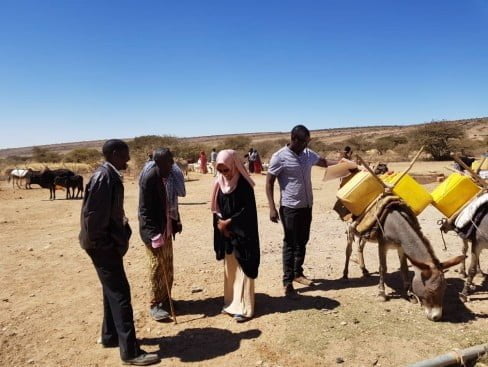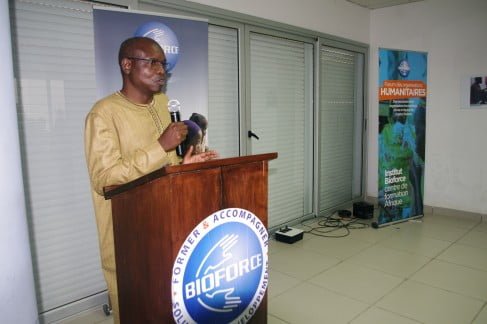Transferts monétaires et mobilité humaine
Les transferts monétaires sont souvent utilisés lors de crises afin de répondre aux besoins des personnes migrantes. Dans cette page, vous trouverez des ressources sur les transferts monétaires et la migration.

La Croix-Rouge se prépare à fournir une aide humanitaire aux migrant·es de la caravane sur le point de quitter le Honduras pour le Guatemala.
©Johannes Chinchilla / FICR.
Conflits, crises économiques et catastrophes sont autant de raisons ayant contraint des personnes à fuir et à traverser des frontières dans des conditions éprouvantes et risquées, en quête de sécurité et de moyens de subsistance. En 2020, le nombre de personnes déplacées de force s’est envolé au niveau sans précédent de plus de 80 millions de personnes, soit près du double du nombre enregistré il y a une dizaine d’année. Cette tendance s’aggrave et les effets du changement climatique menacent de déplacer jusqu’à 200 millions de personnes d’ici 2050.
L’assistance monétaire est de plus en plus utilisée afin de répondre aux besoins des personnes en situation de déplacement. On y a eu recours à grande échelle dans différents contextes de migration, en Europe en 2015 jusqu’au Venezuela pour « los caminantes ». Elle a également été utilisée dans d’autres crises migratoires, notamment en Amérique centrale, au Sahel, en Méditerranée et dans la Corne de l’Afrique. L’assistance monétaire est à l’heure actuelle l’une des principales formes d’aide apportée aux populations déplacées en Ukraine et dans les pays voisins.
Il existe une myriade de perspectives et de définitions concernant le mot « migrant·e » et la façon dont les humanitaires doivent agir. C’est pourquoi nous ne choisissons pas une définition unique pour le moment, étant donné que les discussions sur l’assistance monétaire et la migration en sont encore à leurs prémices et que le langage évolue encore.
Documenter et partager les données probantes donnera lieu à des interventions plus efficaces. Cette page contient une sélection de ressources utiles concernant la migration et le recours à l’assistance monétaire. Elle sera mise à jour au fil des discussions ayant lieu dans les espaces humanitaires des transferts monétaires.
Priorités actuelles
Afin de contribuer aux progrès relatifs à cet enjeu, nous nous engageons à :
- soutenir la création de données probantes aux niveaux régional et mondial ;
- contribuer aux solutions pratiques visant à mettre en œuvre les transferts monétaires auprès des personnes migrantes ;
- organiser des discussions sur les enjeux majeurs basées sur des données probantes.
Contenu récent

Identification Et Attenuation Des Risques D’Abus De Pouvoir Lies A L’assistance Monetaire Au Burundi
Rapport
Ce document présente les enseignements tirés de la mission conjointe HCR-PAM au Burundi visant à identifier et à atténuer les risques d’abus de pouvoir liés à l’assistance monétaire. L’analyse s’est focalisée sur l’assistance monétaire par téléphone mobile pour le retour volontaire...

It’s Planning Season Again – What CVA actors need to know about changes to the Humanitarian Programme Cycle
Blog Post
This time last year we wrote a planning season call to arms, urging Cash Working Groups (CWGs) and Clusters to work together for better inclusion of cash and voucher assistance (CVA) in the Humanitarian Response Plans (HRP). Well planning season has rolled around again, this time with some significant...

Compte-rendu du Cash Working Group Burkina du 23 août 2019
Rapport

How Will Financial Assistance Look in 2030? Here are your thoughts so far
Blog Post
In 2030, humanitarian crises and the ways in which humanitarian needs are met will look very different from today. The role of financial assistance is growing: it is estimated that $4.8 billion was delivered in cash and voucher assistance (CVA) in 2018, as well as $686 billion in remittances, while 2.5...

Celebrating #WomenHumanitarians from our Membership for World Humanitarian Day 2019
Blog Post
World Humanitarian Day is held every year on 19 August to pay tribute to aid workers who risk their lives in humanitarian service, and to rally support for people affected by crises around the world.

Lessons in Driving Large Scale Change: the CALP Network’s reflections from the Humanitarian Innovation Exchange
Blog Post
The scaling of cash programming, enabled by mobile money, represents one of the most significant recent innovations in the humanitarian sector. In two guest blogs for Elrha (Enhanced Learning and Research for Humanitarian Assistance), our Director Karen Peachey explores the CALP Network’s role in...

Guidance on Market Based Programming for Humanitarian WASH Practitioners
Guidelines and Tools
The purpose of this document is to provide practical guidance in preparedness, assessment, program design, implementation and monitoring related to Market-Based Programming (MBP) in humanitarian WASH assistance, and more specifically on: How to identify linkages between markets and WASH services &...

Leveraging Cash and Voucher Assistance in Gender-based Violence Prevention and Response
Blog Post
Despite a reported 60% scale-up in cash and voucher delivery from 2016-18, its use for protection outcomes – including to support the prevention of and response to gender-based violence – trails behind that of all other sectors. In our latest guest blog, Tenzin Manell of Women’s Refugee Commission...

Webinar: Help shape the Future of Financial Assistance report
Event
This webinar presented the scenarios and key issues arising from the CALP Network and IARAN's analysis and invited participants' input, ahead of the publication of the Future of Financial Assistance report

A New Blueprint for the Future of Financial Assistance
Blog Post
Ahead of our workshop on the Future of Financial Assistance in Amman on 24 and 25 July, Paula Gil Baizan, independent expert and a member of the steering committee for the CALP Network’s Future of Financial Assistance work, encourages us to re-imagine the blueprint upon which we build the future of...

Compte-rendu du 04 juillet 2019-CWG Burkina
Rapport
Compte-rendu du 04 juillet 2019

Compte-rendu du Cash Working Group du Niger du 31 juillet 2019
Report

Social cash transfers, generational relations and youth poverty trajectories in rural Lesotho and Malawi
Report
Report on an ESRC-DFID-funded three-year collaborative research project (ES/M009076/1) Social cash transfer schemes, which disburse cash to poor and/or vulnerable people, have proliferated across sub-Saharan Africa over the past two decades. There is growing evidence that these address symptoms of poverty...

Mitigating Risks of Abuse of Power in Cash Assistance in Afghanistan
Report
This document outlines lessons learned from a joint UNHCR-WFP project in Afghanistan aimed at identifying and mitigating the risks of abuse of power in cash assistance. The cash transfer mechanisms discussed during the mission were cash distribution through Hawalas, mobile token, mobile e-vouchers and...

Compte-rendu du Cash Working Group de Yaoundé du 17 juillet 2019
Rapport

Compte-rendu du Cash Working Group du Mali du 04 juillet 2019
Rapport

Retour sur la cérémonie de remise de diplômes par l’Institut Bioforce à Dakar.
Blog Post
Jeudi 13 juin 2019, le CALP Network a participé à la cérémonie de remise de diplômes organisée à Dakar par l’Institut Bioforce, un de nos orgaismes de formation partenaires. Lors de cet événement ont été diplômés tous les étudiants de Bioforce ayant suivi les cours fondamentaux des...

Highlights from Bioforce Institute Graduation Event in Dakar
Blog Post
On Thursday 13th June 2019 the CALP Network was part of a graduation event hosted by the Bioforce Institute, one of our training partner organisations. This event celebrated the graduation of all the Bioforce students that followed the CALP Network’s CVA fundamentals course, which was delivered by our...

Cash Coordination: A proposal from members in MENA
Blog Post
Earlier this year the CALP Network undertook regional consultations to explore options for cash coordination. This blog lays out recommendations from participants from the Middle East and North Africa who sketched out what cash coordination, and coordination more broadly, could look like in future to...

Major Humanitarian Donor Agencies Issue Joint Donor Statement on Cash
News
Senior officials from major donor agencies EU/DG ECHO, Germany, Norway, Sweden, Switzerland, the United Kingdom and the United States of America have released a 'Joint Donor Statement on Humanitarian Cash Transfers', identifying priority areas where donors can improve coordination by focusing on nine...